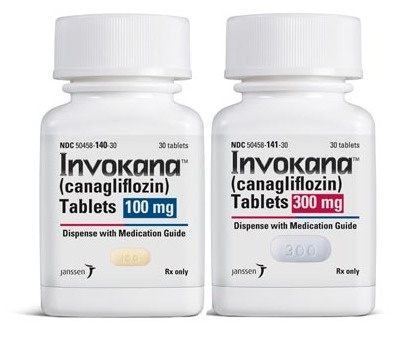Source: Thailand Medical News Oct 25, 2019 5 years, 5 months, 1 week, 12 hours, 58 minutes ago
The US FDA has approved a new indication for the SGLT2 inhibitor
canagliflozin made by
Janssen Pharmaceuticals to reduce the risk for end-stage renal disease, worsening of kidney function, cardiovascular death and hospitalization for heart failure among adults with type 2 diabetes and
diabetic kidney disease. Type 2 diabetes is the leading cause of kidney disease in the world, and the fifth fastest-rising cause of death worldwide.

The new approval is based on results from the phase 3 CREDENCE clinical study, which evaluated the efficacy and safety of
canagliflozin (
Invokana) vs. placebo for adults with type 2 diabetes and CKD.
Dr James List
, global therapeutic area head of cardiovascular and metabolism for Janssen Research and Development commented in a interview with
Thailand Medical News "With the approval of these new uses,
Invokana is now the only diabetes medicine indicated to help type 2 diabetes patients reduce the risks associated with
diabetic kidney disease, including hospitalization for heart failure.This significant advancement addresses serious unmet needs and could change the trajectory of care for the many millions of patients living with type 2 diabetes and
diabetic kidney disease."
"We know that the real battle to turn the tide on kidney disease is in early detection and slowing its progression so that patients stay healthier and fewer patients reach kidney failure. We are so grateful that advances in kidney disease research are producing treatment options that help to slow the progression of
diabetic kidney disease and reduce the risk of hospitalization for heart failure."commented Dr LaVarne A. Burton
, President and CEO of the American Kidney Fund in an interview with
Thailand Medical News.
The US FDA approved a new indication for the SGLT2 inhibitor
canagliflozin to reduce the risk for end-stage renal disease, worsening of kidney function, cardiovascular death and hospitalization for heart failure among adults with type 2 diabetes and
diabetic kidney diseas
e.
The CREDENCE trial, originally estimated to be completed by 2020, was designed to assess whether
canagliflozin had a renal and vascular protective effect in reducing the progression of renal impairment relative to placebo in participants with type 2 diabetes, stage 2 or 3 CKD and macroalbuminuria. The trial enrolled 4,401 patients with type 2 diabetes and an estimated glomerular filtration rate between 30 mL/min/1.73 m
2 and 90 mL/min/1.73 m
2, and albuminuria, defined as a urinary albumin to creatinine ratio between 300 mg/g and 5,000 mg/g.
Medical researchers found ESRD, doubling of serum creatine and renal or CV death occurred for 340 patients who took placebo and for 245 patients who took canagliflozin (HR= 0.70; 30% reduction with canagliflozin). Regarding renal-specific outcomes, a composite of ESRD, doubling of serum creatine or renal death occurred for 224 patients who took placebo and 153 patients who took
canagliflozin (HR = 0.66; 34% reduction with canagliflozin).
Furthermore, researchers observed a 32% risk reduction of ESRD among patients who took
canagliflozin (HR = 0.68), as well as a 28% risk reduction for starting dialysis, having a kidney transplant or experiencing renal death.
In subgroup analyses of CREDENCE, researchers reported that
canagliflozin also reduced risk for a CV event or renal failure among adults with type 2 diabetes and CKD regardless of prior history of CVD, making CREDENCE the first study to show a CV benefit for any type 2 diabetes treatment in a primary prevention cohort.
With the approval for this new indication for Invokana, physicians will not only be able to help reduce the risks associated with
diabetic kidney disease, but also reduce the risk of hospitalization for heart failure in patients with type 2 diabetes and DKD.
Based on results from the CREDENCE trial, FDA approved
canagliflozin to treat
diabetic kidney disease and to reduce the risk of hospitalization for heart failure for the roughly 1 in 3 patients with T2D who also have
diabetic kidney disease. The CREDENCE study, showed that
canagliflozin reduced the risk of renal failure or death by 30% in this population.
Sold as I
nvokana by Janssen,
canagliflozin was approved in 2013 as the first of the sodium glucose co-transporter 2 (SGLT2) inhibitors, a class of diabetes drugs that represented a departure in methods to control glycated hemoglobin (A1C) that could work alongside existing diabetes therapies.
The SGLT2 inhibitors were the first drugs to lower A1C shown to reduce cardiovascular events. additional results from CREDENCE showed that
canagliflozin prevented renal decline in those with T2D(Type 2 diabetes) who had been diagnosed with CV disease or had already experienced an event such as a heart attack or stroke, known as secondary prevention, as well as those who had neither, known as primary prevention.
Janssen and researchers on CREDENCE have both described the use of
canagliflozin to prevent renal failure as the first breakthrough in treating chronic kidney disease in 20 years. Preventing patients from progressing to end-stage renal disease would potentially yield huge savings; few conditions strain the US health system as much as end-stage renal disease, which affects 820,000 individuals at a cost of US$89,000 per person. It is anticipated that without a way to halt progression, more people will need dialysis because more Americans are becoming obese. The problem is also growing worldwide especially in Asia.
